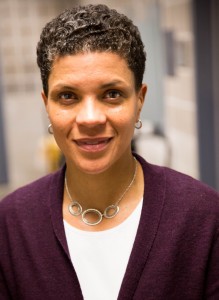Q: Can you briefly take me through what made you decide to write this book? What was the process like?
A: I was really inspired to write the book from my experiences working as a civil rights lawyer and advocate at the American Civil Liberties Union in Northern California. I was representing victims of racial profiling and police brutality, investigating patterns of drug law enforcement and attempting to assist people who had been released from prison as they faced one legal barrier after another to reentry.

Michelle Alexander gave a talk at Lehigh on Wednesday, January 28, 2015 about the issue of race and mass incarceration in the United States. Alexander is the writer of the nationally recognized book, “The New Jim Crow” which discusses the parallels between slavery, the Jim-Crow era, and today’s mass incarceration system. (Chester Toye/B&W photo)
I had a series of experiences that really began my awakening. I began to awaken to the reality that our criminal justice system was now functioning much more like a system of racial and social control than a system of crime prevention and control. So I felt compelled to write the book in the hopes that other people might be able to have the same kind of awakening that I finally did and come to see that mass incarceration really is the most pressing racial justice issue of our time.
Q: Was there anything you found while researching for the book that really struck you or surprised you?
A: I think I had always known that there were racial disparities in drug law enforcement and incarceration rates. But it wasn’t until I really began digging in my research that I came to learn, for example, that there are more African Americans under correctional control today than were enslaved in 1850. I came across statistics that were so jaw-dropping that I was amazed that there wasn’t a national conversation about how entire communities really found themselves trapped once again in a second-class status. And that so much of this was driven by a drug war that was rooted in misconceptions about the use of drugs by African Americans. I think I was also particularly struck in my research that policy makers have known for decades that people of color are no more likely to use or sell illegal drugs than whites, but yet have tolerated such grossly discriminatory rates of incarceration for so long.
Q: In the foreword of your book, written by Cornel West, he says: “this book is a genuine resurrection of the spirit of Martin Luther King Jr.…” Were you trying to evoke the spirit of Dr. King while writing the book?
A: I wouldn’t say that I was trying to evoke it but I have to say that in my own life and work I have been profoundly influenced and inspired by Dr. King. I think that in many ways it really is our job, or task, to pick up where he left off. One of the challenges is that the trail is not blazed for us. He blazed a trail and went as far as he could and it stopped. So now its up to us to figure out how to carry on— and that’s not easy, but it’s necessary. I’m very hopeful that what we’ve seen in recent months will translate into a much broader commitment to movement building, not only to end mass incarceration but in support of basic human rights for all.
Q: What was the response to your book after its release?
A: My book was released right after Barack Obama was elected. So when the book was first released our nation was awash in post-racialism and the sense that we had overcome. Nobody wanted to talk about the possibility that a new caste-like system was created. And so for the first year and half after the book was released, I was desperate to find anyone who would listen to the message. I was speaking in church basements and to very, very small audiences, trying to find a way to get this conversation and dialogue going. But eventually I think after some of the initial euphoria over Obama’s election began to wear off, and as many states were facing bankruptcy, in large part because of the cost of the prison system, there was an opening created to have this larger conversation and things changed. I found that both the media and other audiences were much more receptive.
Q: Why do you think it is important for colleges to have celebrations, such as this in honor of Martin Luther King Jr?
A: Part of it is that if we weren’t having these kinds of celebrations, we wouldn’t be talking about him at all. Right now we talk about him once a year. If these celebrations weren’t happening it is quite likely that there would be only the dimmest of memories of the contributions he made and the implications of his life for the challenges we face today.





Comment policy
Comments posted to The Brown and White website are reviewed by a moderator before being approved. Incendiary speech or harassing language, including comments targeted at individuals, may be deemed unacceptable and not published. Spam and other soliciting will also be declined.
The Brown and White also reserves the right to not publish entirely anonymous comments.